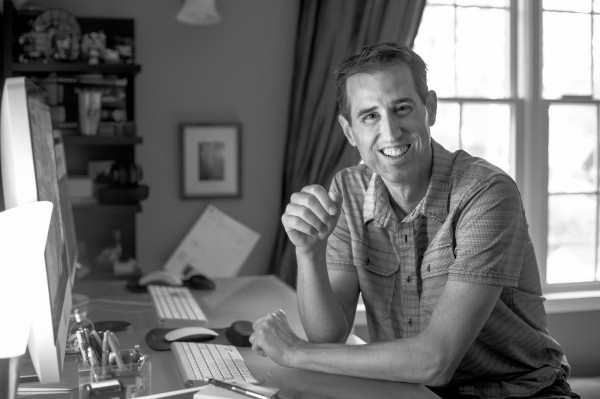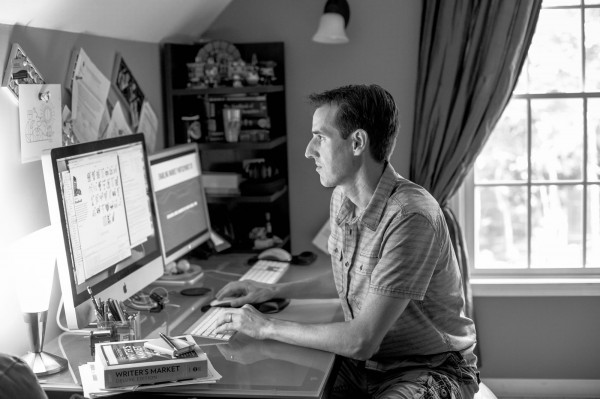
Interview with Scott about working remotely for 20 years
How did you get started with remote work?
I got started working remotely in 1998. I had been working in New York City for the first few years of my career. I was eager to make some decisions about my professional life before getting married.
My wife and I had explored myriad housing options in New York and on Long Island but nothing seemed to fit. Restless, I was beginning to see a job change as an avenue to a geographic change.
I had a good job in a big city, yet my heart was telling me that it was not my path.
You might think me naive for doing so, but I told my boss the truth. I told him I was about to be married, and Amy and I were looking to live outside of the New York City area. To that end, my goal was really to inform him that I was going to be looking at other jobs: either transfers internal to the bank or finding another company. I had no other angle. No other goal.
He considered what I said carefully. After just a few beats, he asked “How would you like to work from home?” Mind you, this was in 1998, and working remotely was not as popular as it is now.
Making the switch was seamless, though. The company put an ISDN line into my new apartment in Massachusetts. Several years later when we wanted to move farther away, they were totally cool with it, as long as I could get to New York City when they needed me. Fast forward 20 years, and I’ve been working remotely the whole time.
Read 114 answers from other remote workers
What are you working on?
I am currently working on web design and front-end development for Intercontinental Exchange. They’re in New York City, about 5 hours from my home in upstate New York.
I’m on a hybrid team: some onsite in NYC and some remote. Some consultants are in South America and Asia, too.
I also have projects of my own, though they’re more creative in nature, involving art and music. I have recently discovered a passion for writing, too, and have a book that’ll come out about working remotely.
Finally, I moderate a weekly chat (#remotechat) about working remotely. If you want to follow along, it’s at @workingrem on Twitter.
Read 107 answers from other remote workers
What's your typical work routine?
I’m married and have two grade-school kids, so my routine is largely aligned to the school schedule.
My wife and I wake up daily at 5 a.m. and use that time to bake (she owns a bakery, Emoticakes) and write (I love to write in the pre-dawn hours downstairs on an iPad Pro).
When the kids wake up at 6, we shift into getting breakfast and getting ready for school. The house is empty at 7:30, so that’s when my work day begins. I take breaks for fitness or to relocate to a coffee shop to work sometimes, but most of the day I’m in my dedicated home office with our family’s pet rabbit, Snowball.
Everyone gets home sometime between 3 and 5, and we invariably have evening activities to juggle. I’m done working around 5, then, since we typically have dinner shortly thereafter.
The weekends are free of work for me, though we continue to wake up early and still have that same morning routine. It’s so hard to sleep in now that we have such a strongly-ingrained weekday routine!
Read 92 answers from other remote workers
Do you have a dedicated space to work?
I have a dedicated home office upstairs in our house.
When we designed it, we knew it would need to be able to be quiet, so built extra insulation into the walls and ensured it wasn’t a room you had to go through to get somewhere else.
I like that it’s relatively distraction-free, so the most important feature is that it’s quiet. I have a glass-topped desk that I love, and look out over our backyard’s garden and sauna.
I also share my space with our family pet rabbit, Snowball.

Read 93 answers from other remote workers
What are the challenges of working on a hybrid remote team?
With hybrid teams, for better or worse, you have to recognize that there’s an us vs. them dynamic at play.
I visit the mothership often enough to know what the culture is like. What are people’s commutes like? Where do they lunch? What is their working environment? What’s the setup in the conference room where they’re all huddled for our daily?
Knowing these things helps me be a fuller social participant in our conversations. If there was no onsite contingent, we’d all be on the same plane. I’ve been on hybrid teams my entire career, and have gotten very good at becoming part of the team without physically being there.
Read 4 answers from other remote workers
What tools do you use to stay productive?
I use the same tools that I’d use for onsite work, and they’re pretty basic: Laptop, phone, decent internet connection and VPN.
Collaboration tools like Skype for business and WebEx are critical for remotes.
I’d use Slack if it was part of our stack (I’m in a bigger company), but ironically video has never been part of the culture. As a designer and front-end developer, I make a point to keep pace with change and workplace trends.
For example, I’m really comfortable with my editor, but am downloading a new editor that my team has been testing out. You can’t be afraid to shift with the times!
Read 108 answers from other remote workers
How do you stay on task?
I write most everything down.
Using things like Evernote (for unstructured text and document scans), Google Drive (tabular data and form-based content) and Wunderlist (for task lists) keeps the clutter out of my brain and frees it up for more creative pursuits.
As a web designer and developer, I need swaths of time in flow to get good work done. When it’s time to get to it, I set my instant messenger on Do Not Disturb, put on some ambient music that won’t distract me too much (Brain.fm is awesome for this) and get the task done.
If I have something particularly finite yet onerous to do, I relocate to another place, like a coffee shop, and commit to not getting back up until the job is done.
Read 100 answers from other remote workers
What do you like about remote work?
I like that distractions are mostly of my own design.
There’s so much about commuting and office life that you can’t control, right down to someone talking to someone else in the room you’re in.
If I need quiet, I get quiet. If I need socialization, I can go out and make that happen. If I need to go for a walk, run or hike to clear my head, my door is right there.
Probably the best thing, though, is being able to be there for my family. If my kids forgot something at school, it’s not a big deal. Having a dentist appointment doesn’t derail my day, as it takes just a half hour. These are things I don’t have to tell my manager about, since they’re so quick.
Life doesn’t get in the way of remote work; it complements it rather well.
Read 106 answers from other remote workers
What do you not like about remote work?
Working remotely can be isolating. I’m an introvert, and even for me the silence can get to be a bit too much. It helps to have someone else in the space with you: a spouse, significant other or another co-worker.
It’s important to make connections, so I make a point to schedule coffee, hikes or other social things with friends.
Just stepping out once for a coffee midday is a really good way to counter some of that feeling of isolation.
Read 103 answers from other remote workers
Do you have any advice for remote workers?
I’ve been working remotely for 20 years, and have done so in a variety of capacities.
I’ve managed distributed teams and been a solo contributor. Ive worked from spare bedrooms, dedicated offices, coffee shops and back porches.
The last bit of advice I have is to be a lifelong learner.
What fuels you? Working remotely can afford you the time and energy to pursue some of those things, so don’t wait for it. Make a plan.
If you want to learn a new technical skill online, pick up the guitar, join a community group, start drawing or build something in the garage … go for it. I have seldom worked on something that hasn’t influence my paid gig in some way.
Read 39 answers from other remote workers
What did we forget to ask Scott Dawson?
At RemoteHabits we're always trying to improve our interviews, what question should we have asked Scott Dawson?
Biography
Scott Dawson
Scott moderates a community for remote workers on twitter, along with the The Art of Working Remotely companion site. If you’re a remote worker and want to connect with other remote workers around the world, come follow along: subscribe to the website and join in the weekly #remotechat at @workingrem. Scott can be found personally at @scottpdawson and scottpdawson.com.
Work remotely? Share your story on RemoteHabits!
Want to be interviewed? If you have a remote position, head over to the interview me page!
Looking for a remote job?
RemoteHabits Jobs has everything you need to find your next great remote work position!
Related Interviews
Interview with Patric, a UX designer and usability engineer that works from home
Patric works on his own projects while also consulting for medium sized software companies, learn how he works remotely.
Interview with Eddie, an Engineering Director
Eddie is an Engineering Director - learn how he manages to absorb interruptions and manage information overload while staying productive.
Interview with Alyssa, a copywriter and content strategist
Alyssa has found her rhythm as a freelancer and founder of the blog, Freelancing Flow—see her tips for keeping it all running smoothly.


